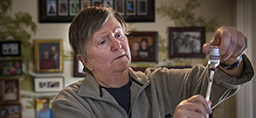
Paper, pencils and folders? Check!
Backpack, crayons and Elmer’s glue? Check! Check!
Medication and glucose monitoring strips? Well…
Getting your kiddos ready for a new school year can be a whirlwind of shopping, packing and planning. For parents of children with diabetes, however, back-to-school time can be a little more worrisome.
But before the first school bell rings, make sure you and your child are prepared for anything and feel great about the upcoming school year.
Ease your mind a bit by knowing that yours will be one of many children attending the school who have special health needs. From peanut allergies to asthma, schools are better prepared than ever to handle students’ health situations.
“It’s difficult for many parents to let go,” said Elizabeth (Libby) Downs, MS, RD, a diabetes educator. That’s especially true for parents of a child who’s recently been diagnosed. “The worry is fueled by new challenges.”
But here’s the good news: You can do this.
Make a plan, together
Downs has counseled many parents and children through the process of preparing for school.
One key fact to remember, she emphasized, is that “this is a gradual hand-off, not just one day. Each child develops in their own way and at their own pace.”
First, Downs recommends that parents—especially those with younger children—become friendly with administrators at their child’s school. Some schools have nurses, but many don’t. If there isn’t a school nurse, parents may choose to become chummy with a teacher or staff member who can be an advocate for their child.
Is your child able to count carbs, or able to do self-tests for blood sugar levels? Can your child administer insulin shots? Answering “no” to any of these questions increases the importance of having an open-ended parent-school partnership.
If a school isn’t accustomed to helping children with diabetes, Downs suggests familiarizing yourself with resources from the American Diabetes Association. The ADA has some excellent guides to help parents and school officials, she said. Knowing that administrators are able and happy to help your child will ease the transition.
If you, your child and your child’s health care provider sit down to put together a care plan for school, you’ll be even further along the path to a smooth school year. These care plans are formally known as a diabetes medical management plans.
“They bring it to the school,” she said, adding that the plan helps identify who will help your child on a daily basis as well as how a medical situation should be handled if one arises. The plan also includes your child’s blood glucose goals and insulin doses.
It should be noted that your child just wants to be a kid. Let them be. Plan to gradually increase their care management duties as they’re ready and show interest in taking on a greater role.
“Diabetes burnout is a huge issue,” Downs said, discussing how a person may tire or become frustrated with his or her condition and ignore pieces of daily management. “Everyone with diabetes reaches a burnout at some point in their journey—some more than once. With children, we try to postpone that as long as we can.”
Downs suggested that you talk with your child before the first day of school.
“If the child is ready, it’s good to give him or her some responsibility,” she said.
For instance, younger children could be taught to understand the role of carbohydrates in their diet, and how to treat the highs and lows that come with fluctuating blood sugar levels, such as with snacks. Older children may eventually do their own injections or manage their insulin pump.
“A lot of them really know so much,” Downs said of her young clients.
Make sure testing supplies, insulin pens and extra snacks are within easy reach at school. Some schools, if asked, will be flexible about snack time or lunches.
What about classmates?
“Kids are less judgmental than adults,” Downs said. “A lot of kids are curious and may want to ask questions. Some kids with diabetes feel very comfortable about sharing with others. But other kids might not.”
A child who’s shy may feel more comfortable if a friend, or a classmate who also has diabetes, accompanies them for their blood glucose testing. Remember, she said, every child is different.
Downs said that local chapters of the Juvenile Diabetes Research Foundation can help parents with school preparations. The foundation gives Bags of Hope to schoolchildren with diabetes. These are backpacks with a blood glucose meter, a book about their situation, and other helpful items.
Spectrum Health diabetes educators are also ready with advice on all aspects of this process, for the children as well as the parents, including support groups that enable parents to exchange ideas.
By the time a child goes away to college, their independence may be clear.
Even so, parents should encourage their college-bound child to register with the proper campus office so their medical conditions are on record. This will make it easier to get administrative support if your child becomes ill and requires assistance. And several online resources could also help your young adult, too, such as the College Diabetes Network.
 /a>
/a>
 /a>
/a>
 /a>
/a>